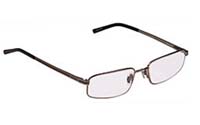PRESERVING YOUR VISION AS YOU AGE
PRESERVING YOUR VISION AS YOU AGE.
By MARC GROSSMAN.
“May you live to see your children’s children” is a beautiful blessing. As people are living longer, we may well be able to append another generation to that and justifiably hope to live to meet our children’s children’s children. But, as the saying goes, it’s not just about surviving long enough to be around when our grandkids or our great grandkids are born, it’s about the ability to actually see them. As more and more of us enjoy the gift of longevity, it becomes increasingly crucial that we think about how we will preserve our vision across a lifetime.
When we hear statistics like “one in three Americans will have an eye disease by age 65” we can react to that information in a couple of ways. We can shake our heads and reach for our eyeglasses and say “wow, it stinks to get old.” Or, we can decide not to be a statistic and take some control of our eyes’ health. Contrary to popular belief, eye disease is not inevitable and there are steps that we can all take to achieve and maintain healthy vision.
An integrative approach to health means that no single part of the body and no single aspect of one’s lifestyle can be considered in isolation from the whole. This means that whether or not you develop an eye condition is reliant not just on the health of the eyes, but upon the health of the entire system. The prevention and treatment of eye disease requires a full evaluation of lifestyle, habits, exercise routine, stress management, and diet.
Some typical elements of the western way of life are actually quite damaging to the eyes. Over 20% of adults in the UK still smoke and this addiction dramatically increases one’s susceptibility to a number of eye diseases, especially cataracts and macular degeneration.
While enjoying a single glass of red wine in the evening has measurable health benefits, drinking more than that can contribute to the development of conditions like glaucoma and diabetic retinopathy.
Eating what often passes as the “standard” American diet can also set you up for the eye conditions that are often considered synonymous with aging. Overindulgence in sugar, caffeine, and refined foods, and the intake of hydrogenated oils (like margarines) are all associated with health problems that can jeopardize your sight.
But maintaining healthy eyes for life is more than staying away from things on a list of “don’ts.” You know that exercise can help keep your heart strong and your waist slim, but did you know that it’s good for the eyes too? A minimum of 20 minutes of aerobic exercise four days per week raises oxygen levels in the cells and increases lymph and blood circulation – all of which are vital to good vision.
Effective stress management techniques don’t just help moderate our blood pressure and keep us happy. When we are under stress we cannot properly absorb the nutrients from our food that our eyes rely upon. Our eyes, like the rest of the body, can benefit from finding stillness and peace in a daily practice of meditation, yoga, tai chi, prayer, or walks in nature.
In addition to the food products listed above (sometimes it seems like we’re stretching it when we call margarine a “food”), there are few other foods that you should steer clear of when you want to stick to a vision healthy diet. Dairy products, with the possible exceptions of ghee and goat yogurt, should be avoided. Also stay away from white flour and pastas and refined carbohydrates in general. Specific eye conditions have specialised nutritional requirements, but as a general rule, enjoy the following foods: vegetables; eggs; meat (but by and large abstain from pork); nuts; whole grains; and fruit (but in moderation if you have any reasons to be concerned about your sugar intake).
When you stop for a moment and realise how much your eyes have done for you over your lifetime, how all that you have seen and read has shaped the very person you have become, it’s harder to take your vision for granted. Your ability to see affects just about everything you do, so doesn’t it make sense that nearly everything you do affects your eyes?
About the Author
Marc Grossman is a Doctor of Optometry and a Licensed Acupuncturist and co-founder of Natural Eye Care, Inc. He has authored five books on natural eye care and lectures nationally and internationally on holistic eye health. Relying on over thirty years of clinical experience and the latest peer reviewed research, he offers a valuable perspective on diet, lifestyle, and nutritional supplements related to eye health and overall wellness. Learn more about his work at http://www.NaturalEyeCare.com.

